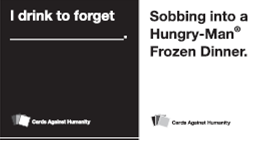For those who have been in hermetic seclusion for the past year or so,
Cards Against Humanity is a crowd-funded spin on the popular card game
Apples to Apples. Rather than the decidedly benign associations
Apples to Apples is meant to evoke,
Cards Against Humanity banks on the violent, the sexual, the political, the religious, the sacrilegious, and every flavor of bizarre deviance its assortment of writers can muster. Instead of simple word associations, the game comes with question or fill-in prompts and a variety of often lengthy answers. The possibilities range from the tragicomic:
…to the surreal:
…to the darkly political:
…to combining all three in the kind of humor trifecta one usually has to find in webcomics with just the right comedic je ne sais quois:
This game is fun.
When I play CAH, my favorite combinations are always the bizarrely sexual ones that involve weird props, historical or mythological figures, and/or horrible things happening to
world-renowned racist clown Glenn Beck. I also have a soft spot for two-part answer prompts. When, “in M. Night Shyamalan’s new movie, Bruce Willis discovers that Justin Bieber had really been Glenn Beck catching his scrotum on a curtain hook all along,” I thrive. But I also get a kick out of answers that sound like what real-world horrible people might say if they didn’t speak in dog-whistles, or that are only a little more absurd than things they’ve actually said:
Not to mention things so cartoonishly overwrought that they’d be rejected as quips from Skeletor or Droopy Dog:
A game of
Cards Against Humanity creates a different, insulated context for all of these things. Almost anything that happens during a CAH session would be wildly inappropriate in any other, and most of it would get someone ostracized from even marginally progressive company thereafter. But inside a game of CAH, the
point is to produce satirical, absurdist commentary on and parody of the world’s awfulness, preferably via accusing it of using its collection of high-tech sex toys to sex up Bert and Ernie while the Buddha and Abraham Lincoln arm-wrestle for sloppy seconds. Used properly,
Cards Against Humanity is a way to rob the world’s evil of some of its power, by making it the subject of humor and declaring this or that villain’s antics the same kind of ludicrous as Pac-Man uncontrollably guzzling cum.
Rush Limbaugh and Ken Ham are essentially real-life cartoon characters as it is—
Cards Against Humanity only holds them to that standard.
The problem is, this particular segment of the humor-scape is where it’s very, very easy to do harm, and even easier to hit nerves. This game’s default options include (or included; see below) a number of unsavory punchlines that become much worse when paired with certain question cards:
To say nothing of the chance of encountering something personally significant in such a jagged game, and having to explain a reaction other people would rightly not have. The best CAH sessions I’ve been part of include the stipulation that if a player doesn’t understand a reference, finds something personally hurtful, or otherwise can’t find the humor in a particular answer card, they can trade it and discard or return the old one, no questions asked.
Cards Against Humanity has been rightly criticized for too often punching down rather than up, and treating the existence and difficulties of many real-world marginalized groups as the stuff of mirth. This has the exact opposite effect from the scenarios discussed above, and is a major detriment to the pleasure that many groups derive from this game. Perhaps no card in the series is more notorious for this attribute than the “passable transvestites” card in the original set, showing all the tact and class of Grand Theft Auto and inspiring a rather graphic disposal from at least one CAH fan. The creators of Cards Against Humanity are aware of this failing and, to their credit, periodically purge cards from the game’s massive accumulated archive as they reconsider whether they cross the line from edgy to cutting. This willingness to admit that finding a particular Cards Against Humanity combination hurtful isn’t the same thing as lacking a sense of humor, “looking to be offended,” or some other strawman of typical progressive attitudes means that the Cards Against Humanity team understands the role that their game plays in our ecosystem. Here’s hoping that the “the profoundly handicapped” card is part of that same rejected set. (Of course, there are other factors at play that could make one queasy about participating in this game or buying it, of a different nature.)
Cards Against Humanityhas earned its place among the pantheon of progressive party games, and I look forward to further opportunities to use CAH to laugh instead of rage or weep at the world’s injustices.









